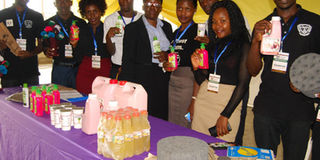Skills centre prepares students for job market

Exhibition. Bishop Stuart University students with their principal investigator for agribusiness project, Dr Rebecca Kalibwani (centre), display some of the products they make at the university on Tuesday. PHOTO BY RAJAB MUKOM
What you need to know:
Aim. The centre offers students entrepreneurship skills so that they can start their own businesses and employ others.
The agribusiness incubation centre at Bishop Stuart University (BSU) is nurturing students into entrepreneurs in order to become job creators.
Dr Rebecca Kalibwani, the principal investigator at the agribusiness incubation centre, says any student at the university who comes up with any workable idea is helped and facilitated to advance it.
The centre was started in 2018 and the initial funding of $50,000 (Shs184.8m) came from Master Card Foundation through the Regional Universities Forum (RUFORUM).
“At the backdrop of youth unemployment, we decided to give entrepreneurship skills to students so that by the time they leave university, they are not only employable but are also able to start their own businesses and employ others,” Dr Kalibwani says.
The university identifies coaches who train and skill students with feasible ideas and after they embark on production.
Yoghourt, wine, briquettes, charcoal stoves, ovens, fruit juice and skin care products are some of the products students are making. They also exhibited some of the products at E-summit on climate change resilience and agribusiness development at the university on Tuesday.
Beneficiaries speak
Ms Anita Atuhaire, a fourth year law student, is one of the entrepreneurs and a co-founder of Magyezi Energy Company that makes briquettes, charcoal stoves and ovens.
“Back home I could see a lot of waste and thought of how I can turn them into something of economic value and also save the environment. As I was looking for ways of how to go about it, this programme of agribusiness came up in my third year. I sold my idea and it became one of those that were to be supported,” Ms Atuhaire says.
She adds that she received training from experts brought by the university. “I am pursuing law but I see this company might bring in more money when it grows. The business is also in line with my passion of environment protection,” Ms Atuhaire says.
She sells a briquette at Shs1,000, charcoal stoves between Shs25,000 and Shs45,000 and an oven at Shs2million.
Ms Patience Nabasa, a third year education student, owns Gifts to Nature Company that makes decorations, bags and mats.
“Since I started this business, I no longer bother my parents so much with tuition. They pay half and I pay the rest, besides meeting my other basic needs,” Ms Nabasa says.
Her raw materials are banana fibres. She sells mats between Shs10,000 to Shs20,000 and decorations between Shs20,000 and Shs50,000.
Mr Hillary Ndahura owns Active Living Company that makes personal care and public health products that include lemon aftershave, lemon hand wash, avocado oil, shower jelly and liquid soap.
“I started with Shs500,000 to buy a manual machine, packing bottles and raw materials but now my business is worth Shs2 million. My efforts have been recognised by some partners such as Association of Volunteers Serving Internationally-a Netherlands agency involved in skilling youth (AVIS) which has supported me with Shs4 million to invest in the business,” Mr Ndahura says.
Partnership
Dr Kalibwani says the university has contacted the Ministry of Science, Technology and Innovations in an effort to work on patenting rights.
“We have already met with officials from the ministry to take us through the requirements to patent our products. We are also working with UNBS on issues of certification,” Dr Kalibwani said.
Professor Alex Ariho, the director of Excel Agribusiness Incubator Ltd, one of the business coaches that have mentored the students says students have better options to solve the unemployment question and transforming the country but the challenge is with the curriculum.
“The curriculum we have in this country bogs down the student’s spirit to think and innovate, they only just go to institutions to pass exams and get good grades. But where are these grades taking them? Of course on streets and committing crimes because they need to survive. But when you engage these students, they have wonderful ideas that only needs mentorship,” Prof Ariho says.
The vice chancellor, Prof Mauda Kamatenesi says: “We have made entrepreneurship course compulsory for every student that passes through our university so that they are equipped with employable and job creation skills.”
Funding
AVSI has offered to support up to 10 students with funds ranging from Shs800,000 to Shs4 million to boast their businesses.
Other partners such as SILGAD (producers of red star wine) TURSAM investments (producers of Uhuru juices) and TEXFAD Ltd (producers of products from banana fibers) are also teaching students about branding, packaging and marketing.




